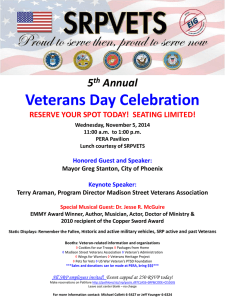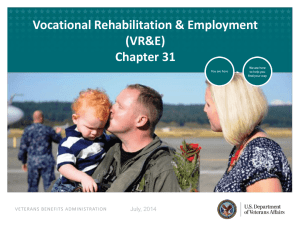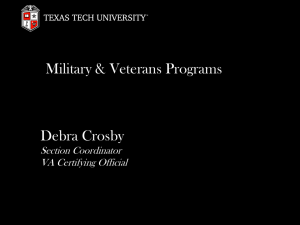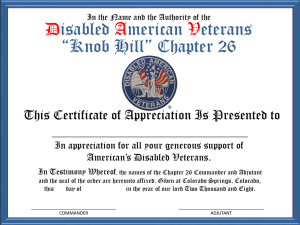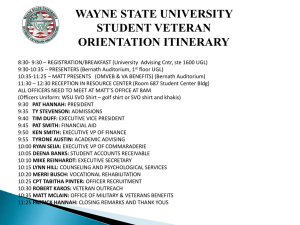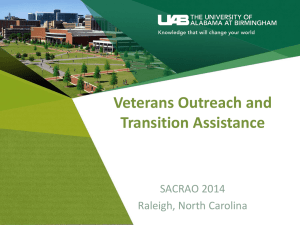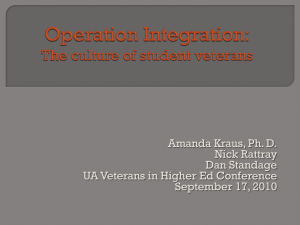2012_credential_role_workforce
advertisement
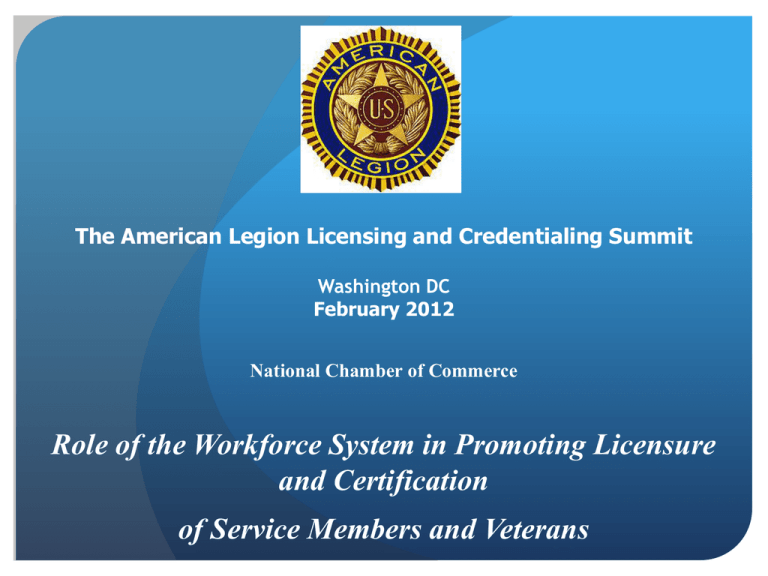
The American Legion Licensing and Credentialing Summit Washington DC February 2012 National Chamber of Commerce Role of the Workforce System in Promoting Licensure and Certification of Service Members and Veterans Bob Simoneau NASWA What is NASWA? • National Association of State Workforce Agencies • Represents Administrators of: – – – – – – Unemployment Insurance laws Employment Services Job Training Programs Labor Market Information Veterans’ Employment and Training Other Programs MISSION of NASWA • Promote - • Engage - in Liaison activities • Facilitate • Initiate State Workforce Agencies - information sharing - training & development activities SWAs SERVING VETERANS • Jobs for Veterans State Grants – DVOP and LVER • Priority of Service for Veterans – Wagner-Peyser (Employment Service) – Workforce Investment Act (WIA) – Other Programs • Transition Assistance Program (TAP) Workshops SWAs SERVING EMPLOYERS • SWAs Serve Employers – Solicit job openings – Reaching out – Promote Hiring of Veterans – Provide Technical Assistance – Provide Resources and Tools NATIONAL LABOR EXCHANGE (NLX) • What is the NLX? • What does the NLX offer? • Connecting Across State Borders • Analytics: – Developing Real-time Demand Information – Traffic of Job Seekers • Skills • Location • Interests CREDENTIALING & LICENSING • States’ Roles in Credentialing & Licensing • Cross-Matching Tools for Occupational Codes • Work with Governors’ Offices Some State Initiatives • Current Activity • Planned Activity • Challenges Bob Simoneau Deputy Executive Director NASWA (202) 434-8021 bsimoneau@naswa.org USDOL / VETS David B. Rich Director Mission of the Veterans’ Employment and Training Service (VETS) To provide Veterans and Transitioning Service members with the resources and services to succeed in the 21st Century workforce by maximizing their employment opportunities, protecting their employment rights, and meeting labor market demands with qualified Veterans. Licensing and Credentialing Resources VETS Field Staff Jobs for Veterans’ State Grants (JVSG) Veterans’ Workforce Investment Program (VWIP) Grants Transition Assistance Program (TAP) Jobs for Veterans Act (Public Law 107288) Jobs for Veterans Act, P.L. 107-288, requires priority of service to veterans and spouses of certain veterans for the receipt of employment, training, and placement services in any job training program directly funded, in whole or in part, by the Department of Labor. Amends the authorized activities of the Local Veterans’ Employment Representative (LVER) staff and Disabled Veterans’ Outreach Program (DVOP) specialists. Jobs for Veterans State Grants (JVSG) Approximately $160 million annually Funds support almost 2,000 LVER staff and DVOP specialist who provide intensive services for Veterans and outreach to the business community Jobs for Veterans State Grants (JVSG) Located in One-Stop Career Centers in the 50 States, the District of Columbia, Puerto Rico, Virgin Islands and Guam Also assist Veterans who receive Vocational Rehabilitation and injured and wounded Veterans through the Recovery and Employment Assistance Lifelines (REALifelines) Program Nationwide Network LVER staff facilitate the delivery of employment and training opportunities and provide job development services for Veterans while providing employment outreach services to businesses and organizations DVOP specialists provide intensive services to Veterans with barriers to employment Veterans’ Workforce Investment Program (VWIP) WIA Section 168 (29 U.S.C. 2913) authorizes VWIP Employment & Training Programs to meet the employability and training needs of veterans: with service-connected disabilities; Veterans who have significant barriers to employment including ex-offenders; Veterans’ Workforce Investment Program (VWIP) Employment & Training Programs to meet the employability and training needs of veterans: veterans who served on active duty in the armed forces during a campaign or expedition for which a campaign badge has been authorized, and recently separated veterans (48 months). VWIP Objectives To provide services to assist in reintegrating veterans into meaningful employment within the labor force. To stimulate the development of effective delivery systems that will address the complex employment problems facing veterans. VWIP Nationally $9.6 Million Dollars authorized for Program Year (PY) 2011 Programs funds 22 Grantees Nationwide (17 of 22 must compete in 2012) $14.5 Million Dollars PY 2012, up to $12.8 million to be competed in Spring 2012 Transition Assistance Program (TAP) 2.5 days of Instruction for Separating Service Members Career self-assessment, guidance, and decision-making; Resume Development; Job Search and Interviewing; Labor Market Information; Licensing and certification Presented at military bases where separation occurs CONUS (including Alaska and Hawaii) OCONUS (Overseas) Transition Assistance Program (TAP) Facilitators LVER staff/DVOP specialists/other State staff Contracted Staff VETS Federal Staff Trained by the National Veterans’ Training Institute TAP - Nationally (2011) 4,203 TAP Employment Workshops conducted CONUS and 601 conducted overseas in FY 2011 144,242 Transitioning Service Members and spouses attended workshops in the U.S. and 11,876 were assisted overseas last year 9 Million to fund States or provides contract support to facilitate TAP workshops Thank You Rich.David@Dol.Gov U.S. DEPARTMENT OF LABOR’S NATIONAL APPRENTICESHIP SYSTEM Franchella Kendall Chief, Div of Standards and National Industry Promotion WHAT IS REGISTERED APPRENTICESHIP ? Combines structured paid on-the-job learning with related technical instruction Guided by a specific set of standards NATIONAL APPRENTICESHIP ACT (29 U.S.C. 50) ESTABLISHED BY CONGRESS IN 1937 Secretary of Labor is authorized and directed to formulate and promote the furtherance of labor standards necessary to safeguard the welfare of apprentices. Extend the application of labor standards by encouraging their inclusion in contracts of apprenticeship Registered Apprenticeship Two Regulations Code of Federal Regulations (CFR) 29/29 Apprenticeship Programs Labor Standards for Registration Revised October 2008 CFR 29/30 promotes Equal Employment Opportunity in Apprenticeship Revisions to CFR 29/29 Apprenticeship completion: Three Approaches -Traditional, time-based -Competency-based -Hybrid How Do you Set Up an Apprenticeship Program? Network of Federal Regional, State and State Apprenticeship (SAA) Directors and Training Representatives to assist employers REGISTERED APPRENTICESHIP The Office Of Apprenticeship and State Apprenticeship Agencies Provides Technical Assistance To Industry In the Following Areas: Analysis of overall training needs Analysis of training content and work process development Development of related instruction curriculum Program evaluation Development of Affirmative Action Plan and Selection Procedure REGISTRATION OF AN APPRENTICESHIP PROGRAM A company or an association, with or without union involvement, registers their program with the Office of Apprenticeship ). This is accomplished through a set of Standards which established the parameters under which the program will operate and includes but is not limited to: On-the job work process Related Instruction syllabus Progressive wage rates Expected work conditions EEO pledge EXAMPLES OF RECOGNIZED APPRENTICEABLE OCCUPATIONS Airframe and Powerplant mechanic Electrician Nurse Assistant Certified IT Generalist APPRENTICESHIP CREDENTIALS “Certificate of Training” (Intermediate skills recognition) “Certificate of Completion of Apprenticeship” MILITARY APPRENTICESHIP PROGRAMS (ACTIVE DUTY) United Services Military Apprenticeship Program (USMAP) (Navy, Marines and Coast Guard) Have over 124 apprenticeable occupations registered Currently over 63,000 Active Military are participate this program MILITARY APPRENTICESHIP PROGRAMS (ACTIVE DUTY) United States Army Apprenticeship Program—Culinary Arts The American Culinary Federation (ACF) joined with the U.S. Army to enhance its current foodservice training program by incorporating the American Culinary Federation Education Foundation’s (ACFEF) apprenticeship program into the Army’s foodservice training program Military Apprenticeship Program Army National Guard (GAPI) Army National Guard officially partnered with the U.S. Department of Labor to launch the Guard apprenticeship Program Initiative (GAPI), to be administered locally by states. The aim of this civilian employment assistance effort is to bridge the gaps (real and perceived) between Soldiers’ military training and the application of their training in civilian employment. VETERANS Military Direct Entry Veterans who completed military technical training school and participated in a registered apprenticeship program, or completed military technical training school in a recognized apprenticeable occupation, during their military service, may be given direct entry into the apprenticeship program. UNITED ASSOCIATION VETERANS IN PIPING Partnership between the United Association of Plumbers and Pipefitters and he U.S. Military Provides returning Veterans with 16 weeks of accelerated welding training Training is free to Veterans 200 veterans have completed the training This is a component of their National Guidelines for Apprenticeship Standards HELMETS TO HARDHATS Program Places quality men and women from the Armed Forces into promising building and construction careers The National Joint Apprenticeship and Training Committee for the Electrical Industry has expanded their Qualification for Apprenticeship Section in their National Guidelines for Apprenticeship Standards Advantage to the Employees Classes offered from a variety of venues including community colleges Incremental Salary Increase National and State Recognized Credentials Why it works—Benefits to employer Provides an effective Return on Investment (ROI) for recruiting & training employees Apprentices are productive while learning Ensures that apprentices attain the latest skills required for current and future jobs Provides credentials that validate skills and competencies www.doleta.gov/oa https://21stcenturyapprenticeship.workforce3one.org/ Thank you! Franchella Kendall Chief, Division of Standards and National Industry Promotion Office of Apprenticeship Kendall.franchella@dol.gov Grant Shmelzer Exec Director, IEC- Chesapeake Mid-Atlantic Region State DE DC MD PA VA WV Federally Approved Program Yes Yes Yes Yes Yes Yes State Apprentice-ship Council Yes Yes Yes Yes Yes No Become a journeyman electrician 8,000 hours of on the job training completed a NEC Class within prior 2 years and 4 8000 hours of on the job training 8,000 hours of on the job training and 144 hours in class No licensing requirement Four years of practical experience in the trade and 240 hours of formal training in the trade 8,000 hours of on the job training Become a Master Electrician 6 Years under a master electrician Worked as an electrician for 8 years; 4 as an apprentice and 4 years as a journeyman electrician 7 years experience and pass a state trade exam No licensing requirement 7 Years under a master electrician 5 years Military Veterans are eligible for advanced standing in IEC Chesapeake’s Apprenticeship Programs IEC Chesapeake also offers job placement for each apprentice in the program www.iecchesapeake.com Fortis Institute All-State Career *Fortis College *Landover Campus only Tony daRosa President, Fortis Institute Woodlawn Education for Skilled Professions Medical Assistants Dental Assistants Dental Hygienists Pharmacy Assistants Medical Office Assistants Insurance Coders Medical Billers Radiology Technologists Surgical Technologists Commercial Drivers HVAC Technicians Electrical System Technicians Computer Support Technicians Cosmetologists Massage Therapists Aestheticians Biotechnicians And more... For consumer information visit www.fortis.edu or www.allstatecareer.edu Military experience and training is a plus! • Commercial Drivers * Class A and Class B • Radiologic Technologist * program is accredited by the Joint Review Commission on Education in Radiologic Technology (JRCERT) • Surgical Technologists * program is approved by Commission on Accreditation of Allied Health Education Programs (CAAHEP) Commercial Driver “employment of commercial drivers is expected to increase nationally by about 13% from 2008 to 2018”. (http://data.bls.gov retrieved on 2/2/12) • Commercial Drivers’ License (CDL) is required • Equivalent military specialty is Motor Transport (Army). Due to state-by-state regulations, a military driver’s CDL is not transferrable to a civilian CDL Job growth and wage outcomes can and will vary by area of the country. Visit the Bureau of Labor Statistics web site for local market information: www.bls.gov. *Drive the Guard at All-State Career • Class A CDL Preparatory Driver Training * 4 week customized training agreement between All-State and the Maryland National Guard • Entry into an industry with career opportunity • We are proud of our job placement success rate • Visit www.allstatecareer.edu for placement results Radiologic Technologist “employment of radiologic technologists is expected to increase nationally by about 17% from 2008 to 2018”. (http://data.bls.gov retrieved on 2/2/12) • Must be certified by the American Registry of Radiologic Technologists (ARRT) • Equivalent military specialty is Radiology Specialist (Army). Training is recognized/approved by ARRT; however, veterans must complete approved course curriculum and pass certification exam. •Program prepares individuals for ARRT certification test Job growth and wage outcomes can and will vary by area of the country. Visit the Bureau of Labor Statistics web site for local market information: www.bls.gov. *Radiologic Technologist • 2 year program including clinical rotations • Program prepares graduates to sit for the ARRT certification examination • Fortis accepts direct transfer of applicable credits and military experience *program available in the Woodlawn location Surgical Technologist “employment of surgical technologists is expected to increase nationally by about 25% from 2008 to 2018”. (http://data.bls.gov retrieved on 2/2/12) • Most employers prefer to hire Certified Surgical Technologists • Equivalent military specialty is Surgical Services (AF). Training is not recognized/approved by CAAHEP; veterans cannot become certified without additional training and CST certification test. Job growth and wage outcomes can and will vary by area of the country. Visit the Bureau of Labor Statistics web site for local market information: www.bls.gov. Surgical Technologist • 2 year program including clinical rotations • Program prepares graduates to sit for the CST certification examination • Fortis accepts direct transfer of applicable credits and military experience • programs vary by campus Our Advantage • Career-focused curriculum • Nationally Accredited Institutions that vary by campus • Fortis and All State Career will accept direct transfer of applicable credits and military training • Career placement assistance available for all graduates Thank you for your time today! For consumer information please visit: www.fortis.edu or www.allstatecareer.edu Contact Information Bob Simoneau - State WorkForce Agencies : bsimoneau@naswa.org David B. Rich - US DOL/VETS : Rich.david@dol.gov Kendall, Franchella - ETA : Grant Shmelzer - IEC Chesapeake : GShmelzer@IEC-Chesapeake.com Tony DaRosa - Fortis Institute : TDaRosa@edaff.com Stan Seidel - Easter Seals : Sseidel@eseal.org kendall.franchella@dol.gov
